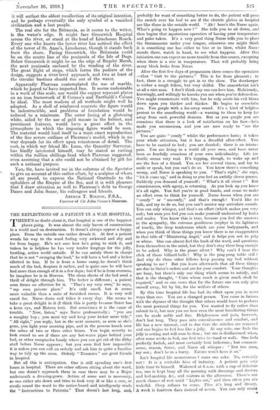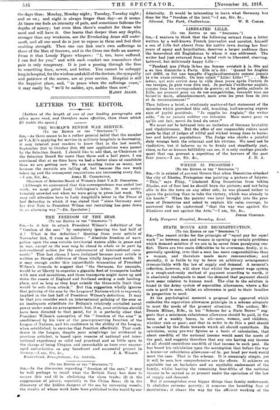THE REFLECTIONS OF A PATIENT IN A WAR HOSPITAL.
THERE'S no doubt about it, that hospital is one of the happiest places going. It was almost the only haven of construction in a world mad on destruction. It doesn't always appear a happy place. From the outside one rather dreads it. At first a patient wends his way to the ward feeling very awkward and shy and far from happy. He's nct sure how he's going to stick it, and unless he is helpless he Las very tender longings for the jolly, hustling, active world outside. If he can satisfy those in charge that he is not " swinging the lead," he will have a bed and a locker allotted to him. If he is from a home camp, he doesn't think much of the bed, despises it rather, and is quite sure he will have had more than enough of it in a few days; but if he is from overseas, he imagines he is in Heaven. The clean sheets of the bed send a thrill of delight through him. The locker is different ; a patient soon forms an affection for it. "That's my very own," he says; " my own private place." It's only small, but it seems more valuable than a suite of furnished rooms. It is very well cared for. Nurse dusts and tidies it every day. She seems to take a great delight in it (I think this is partly because Sister has a keen eye, and Matron too). But sometimes it is the cause of trouble. " Now, listen," says Nurse professionally ; " you are a naughty boy ; , you must try and keep your locker more tidy." " All right," you reply, but in the next moment, as soon as she's gone, you light your morning pipe, and in the process knock over the ashes of two or three other briars. You begin secretly to look round to see if there are any hot-water pipes behind your bed, or other receptacles handy where you can get rid of the filthy stuff before Nurse appears ; but you soon find how impossible it is unless you can call an orderly and ask him in quite a familiar way to tidy up the mess. Orderly " Tommies " are good friends in hospital But all this is anticipation. One is still spending one's first hours in hospital. There are other officers sitting about the ward, but one doesn't approach them in case there may be a Major underneath a dressing-gown. Action of some sort is necessary, so one either sits down and tries to look very ill or like a cow, or strolls round the ward to the notice-board and intelligently reads the " Instructions to Patients." That doesn't last long, and,
probably for want of something better to do, the patient will press the switch over his bed to see if the electric globes in hospital are like those in the outside world. " Ah ! here's the Nurse again. What's going to happen now ? " She tells you to sit down, and then begins that mysterious operation of having your temperature and pulse taken. It's a very good thing Nurse tells you to place the thermometer under your tongue, otherwise one might think it is something one has either to bite or to blow, whilst Nurse stands there, watch in hand, to see what happens. After this initiation one can expect no more trouble from this source, excepting when there is a rise in temperature. That will probably bring many black looks from Nurse.
After the first few days of preparation there comes the operation —that " visit to the pictures." This is far from pleasant ; in fact, there is a struggle to get in to the show. The doorkeeper is rather a rough fellow, but very skilful. The anaesthetist isn't at all a nice man. I don't think any one can love him. Maliciously, knowingly, and willingly he knocks you out when you're defenceless.
You might remonstrate with him, but he only sends his evil blows down upon you thicker and thicker. He begins to overwhelm you. You gurgle with a far-away sound. It's a kind of helpless
protest to the unsuffering world—a warning to them to keep far away from such powerful demons. But as you gurgle you are conscious that there is a look of satisfaction on his face—he's made you unconscious, and you are now ready to "see the pictures."
You are quite " comfy " whilst the performance lasts ; it takes your whole attention, but it has a dreadful after-effect. You have to be carried to bed ; you are dazzled ; there is an intens; pain. You are living iu a world all your own, and have never been so fearfully conscious of your own individuality. Life (or death) seems very real. It's topping, though, to wake up and see the face of a friend. You see her several times, and try to smile or speak, but you can't do so. You know there's something wrong, and Nurse is speaking to you. " That's right," she says. " let it come up," and in doing so you feel an awfully clover person.
Suddenly you demand of yourself : " What's it all about ? " But consciousness, with agony, is returning. As you look up you know
it's all right. You feel you're in good hands, and cease to make an effort even to think for yourself. Nurse knows when you are " comfy " or " uncomfy," and that's enough ! You'd like to talk, and try to do so, but you can't muster any articulate sounds. You can only whisper, and that's an effort (which makes you very sad); but soon you feel you can make yourself understood by looks and smiles. You know this is true, because you feel the answer.; in the sympathy, the extreme gentleness (zephyr in its lightness of touch), the deep tenderness which are your bodyguards, and when you think of these things you know there is no exaggeration in that title of "Ministering Angel," and it helps you not to yelp or whine. One can almost feel the hush of the ward, and questions form themselves in the mind, but they don't stay there long enough to be asked. Why is the piano silent ? Why can't I hear the click of those billiard-balls ? Why is the ping-pong table still ? And why do those other fellows keep passing my bed without speaking to me ? But you learn afterwards that all these things are due to Sister's orders and are for your comfort. 'Your thought; are busy, but there's only one thing which seems to satisfy, and that is the thought., " Unto whom much is given much shall be required," and so one vows that for the future one can only give oneself away, bit by bit, for the welfare of others.
By this time hospital life has had its effect upon you in more ways than one. You are a changed person. You came in furious with the shyness of the thought that others would have to perform the most personal things for you. You wanted to fly rather than submit to it, but now you see how even the most humiliating things can be made noble and fine. Helplessness and pain, however, don't last long. They pass into convalescence and comfort, an .l life has a new interest, and in due time the stitches are remove.1 and one begins to feel less like a jelly. At any rate, one feels the jelly is setting and will soon be firm ; but one is disillusioned when, after some weeks in bed, one first tries to stand or walk. One feels perfectly foolish, and must certainly look ludicrous ; but common- sense, reason, Sister, and Nurse all whisper : " Not too soon, my son ; don't be in a hurry. Nature won't have it so."
Isn't hospital life monotonous ? some one asks. No, certainly not ! It is a veritable hive of industry. A patient gets very little time to himself. Wakened at 6 a.m. with a cup of delicious tea, one is kept busy all the morning with dressings and doctors and bed-making, &c., and visitors in the afternoon. There's not much chance of rest until " Lights out," and then often you are wakeful. Sleep refuses to come. Then it's long and dreary. A week is fourteen days instead of seven. You can only count the days thus Monday, Monday night; Tuesday, Tuesday night ; and so on ; and night is always longer than day—so it seems. At times one feels an intensity of pain, and sometimes fathoms the depths of misery; but even then. there's comfort for those who need and will have it. One learns that deeper than any depths, stronger than any weakness, are the Everlasting Arms still under- neath, and all one need do is just to repose in them and feel their enabling strength. Then one can link one's own sufferings to those of the Man of Sorrows, and in the Cross one finds an answer. From it that Lonely Figure whispers : " I, too, have suffered. I can feel for you," and with such comfort one remembers that pain is only temporary. It is just a passing through the fires to something finer, newer, and better. You cannot be unhappy long in hospital, for the wisdom and skill of the doctors, the sympathy and patience of the nurses, are at your service. Hospital is still the happiest place, and, " in peace when the sufferings cease," it may easily be, " we'll be sadder, aye, sadder than now."
HABBY ALLEN.



































 Previous page
Previous page